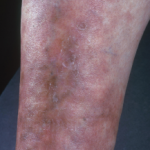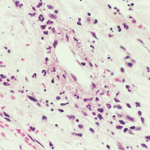In a clinical trial, RA patients on sirukumab experienced decreased disease activity and improved physical function…


In a clinical trial, RA patients on sirukumab experienced decreased disease activity and improved physical function…

New research examined the use of transcranial direct current stimulation over the dorsolateral prefrontal cortex of the brain to modulate attention in patients with fibromyalgia. The study found that the active current increased heat pain threshold and tolerance. However, a regression analysis showed the effect on executive attention appeared to be independent of the effect on pain…
Reuters Staff |
(Reuters)—U.S. Democratic Senator Claire McCaskill sought on Tuesday details from the nation’s top opioid drugmakers on their sales and marketing practices, as lawmakers step up efforts to tackle the country’s deadly opioid crisis. The Missouri senator’s investigation comes amid an epidemic of opioid addiction, with 91 Americans dying everyday as a result of overdose, according…
Ronnie Cohen |
(Reuters Health)—In states that legalized medical marijuana, U.S. hospitals failed to see a predicted influx of pot smokers, but in an unexpected twist, they treated far fewer opioid users, a new study shows. Hospitalization rates for opioid painkiller dependence and abuse dropped on average 23% in states after marijuana was permitted for medicinal purposes, the…
Dustin Volz & David Lawder |
WASHINGTON (Reuters)—President Donald Trump suffered a stunning political setback on Friday in a Congress controlled by his own party when Republican leaders pulled legislation to overhaul the U.S. healthcare system, a major 2016 election campaign promise of the president and his allies. Republican leaders of the House of Representatives pulled the legislation due to a…
Take the challenge. CPT: 99203 This encounter is coded as 99203, because it included: History—The history of present illness was extended. The review of systems was complete, and the past medical, family and social were documented. This makes the history comprehensive. Examination—Expanded detailed. Medical decision making—The diagnosis was a new problem with no additional workup…
A 13-year-old black male, described by his mother as a very active and energetic child, is referred to a pediatric rheumatologist. His chief complaint is muscle pain in both legs, which he has experienced for the past three weeks. His mother is a patient of an adult rheumatologist at this clinic and is quite concerned….

WASHINGTON, D.C.—Rheumatologists do not have up-to-date diagnostic and classification criteria for vasculitis, a group of diseases that involves inflammation of the blood vessels, said experts speaking at the 2016 ACR/ARHP Annual Meeting session, Classification Criteria for ANCA-Associated Vasculitis. The most recent classification criteria were published by the ACR in 1990, and since then, new disease…

WASHINGTON, D.C.—In a session during the 2016 ACR/ARHP Annual Meeting, aptly called Quality Measures and Quality of Care I, a panel of experts presented information on a number of programs underway in rheumatology using quality measures to both assess and improve patient outcomes. Leading off were two presentations on programs using quality measures to improve…

WASHINGTON, D.C.—Experts speaking at the 2016 ACR/ARHP Annual Meeting session, Update on Small-Vessel Vasculitis, offered insight into the latest approaches to the diagnosis and treatment of diseases involving the inflammation of blood vessels. “Vasculitis is an immune-mediated process. White blood cells invade the vessel wall, causing inflammation throughout the vessel wall,” said Jason M. Springer,…